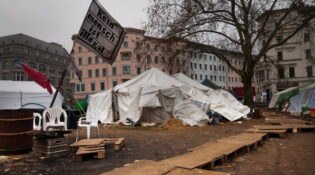On Fiction
Juntas and Housewives: Three Books from Brazil
Brazil’s “ghosts” refuse to stay buried in these three novels.
Infinite Metabolism: Lispector’s Consumptions
And what if we are, I am, you are that marginalized person? When I erase myself, what do I become?
Party On: An experimental review of Ksenia Buksha’s Freedom Factory
It was a surprisingly hilarious novel, a bubbling pot of big personalities, forty short chapters bursting with historical detail, wit, and Communist Party nostalgia.
The gay-suicide stereotype kills gay people, and must end
Friedrich Alfred Krupp, heir to the mammoth Krupp armaments business and the wealthiest man in Germany, committed suicide on 22 November 1902. Only a week before, a socialist newspaper had…
Becoming Visible: On Jenny Erpenbeck’s Go, Went, Gone
Very little in Jenny Erpenbeck’s previous fiction—allegorical, timeless—prepares a reader for the immediacy and moral heft of Go, Went, Gone. It asks the same question Michael Ignatieff did in his…
In the gap between writer and reader, the novel comes to life
There’s an exercise I sometimes get members of book groups to do: I ask each of them to draw a picture of the cabin from my first novel, Our Endless…
The Light of Possibilities: On Patrick Park’s Tucumcari
From the opening sentence of Patrick Parks’ remarkable debut novel Tucumcari, readers are invited into the bewildered reality of a man whose life exists in an interwoven fabric of the…
The Novel is dead, long live the novel
Novelists announce the death of the novel with such sinister regularity you’d be forgiven for thinking they can’t wait to find themselves out of a job. It’s a cyclical theme,…
Re-inhabiting culture, transforming the self: R.K. Narayan’s The Guide
In R. K. Narayan’s novel The Guide (1958) a common con-man, “Railway” Raju, asks for a few choice morsels under the guise of a religious requirement. He’s begging from the…









